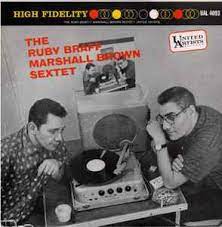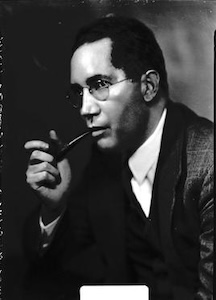
Daily Dose Of Jazz…
Marshall Richard Brown was born on December 21, 1920 in Framingham, Massachusetts and graduated from New York University with a degree in music. He was a band teacher in New York City schools, and one of his school bands performed at the Newport Jazz Festival in the 1950s.
With George Wein, he went to Europe to look for musicians for the International Youth Band. In the late 1950s he started the Newport Youth Band and his students included Eddie Gomez, Duško Gojković, George Gruntz, Albert Mangelsdorff, Jimmy Owens, and Gabor Szabo.
He worked with Ruby Braff, Bobby Hackett, Lee Konitz, and Pee Wee Russell. Valve trombonist and teacher Marshall Brown transitioned on December 13, 1983 in New York City. He was 67.
More Posts: adventure,educator,history,instrumental,jazz,music,trombone

Daily Dose Of Jazz…
Reinhold Svensson was born December 20, 1919 in Husum, Germany. He recorded as a solo artist in 1941-1942, then joined the ensemble of violinist Hasse Kahn. In 1948, Putte Wickman took leadership of the group, and he worked with it until 1960 as a performer, arranger, and composer.
Reinhold appeared at the Paris Jazz Festival in 1949, worked with Arne Domnerus’s orchestra, and played with Charlie Norman in 1950-1951 as a duo under the names Ralph & Bert Berg and the Olson Brothers.
He also recorded with his own ensembles including Ragtime Reinhold. Domnerus, Jack Noren, Simon Brehm, and Thore Jederby were sidemen of his in the late 1940s and early 1950s.
Pianist, Hammond organist and composer Reinhold Svensson transitioned on November 23, 1968 in Stockholm, Sweden.
More Posts: composer,history,instrumental,jazz,music,organ,piano

Jazz Poems
CABARET (1927, Black & Tan Chicago) Rich, flashy, puffy-faced, Hebrew and Anglo-Saxon, The overlords sprawlhere with their glittering darlings, The smoke curls thick, in the dimmed light Surreptitiously, deaf-mute waiters Flatter the grandees, Going easily over the rich carpets, Wary lest they kick over the bottles Under the tables. The jazzband unleashes its frenzy. Now, now To it Roger; that’s a nice doggie Show your tricks to the gentlemen The trombone belches, and the saxophone Wails curdingly, the cymbals clash, The drummer twitches in an epileptic fit Muddy water Round my feet Muddy water The chorus sways in. The “Creole Beauties from New Orleans” (By way of Atlanta, Louisville, Washington, Yonkers, With stop-overs they’ve used nearly all their lives) Their creamy skin flushing rose warm O, le bal des belle quarterounes! Their shapely bodies naked save For tattered pink silk bodices, short velvet tights, Red bandanas on their sleek and close-clipped hair; To bring to mind (aided by the bottles under the tables) Life upon the river— Muddy water, river sweet (Lafitte the pirate, instead, And his doughty diggers of gold) There’s peace and happiness there I declare (In Arkansas, Poor half-naked fools, tagged with identification numbers, Worn out upon the levees, Are carted back to the serfdom They had never left before And may never leave again Bee—dap—ee-–DOOP, dee—ba—dee—BOOP The girls wiggle and twist Oh you too, Proud high-stepping beauties Show your paces to the gentlemen. A prime filly, seh. What am I offered, gentlemen, gentlemen…. I’ve been away a year today To wander and roar I don’t care if it’s muddy there (Now that the floods recede, What is there left the miserable folks? Oh time in abundance to count their losses, There is so little else to count.) Still it’s my home, sweet home From the lovely throats Moans and deep cries for home: Nashville, Toledo, Spout Springs, Boston, Creoles from Germantown;— The bodies twist and rock; The glasses are filled up again…. (In Mississippi The black folk huddle, mute, uncomprehending Wondering “how come the good Lord Could treat them this a way”) shelter Down to the Delta (Along the Yahoo The buzzards fly over, over, low Glutted, but with their scrawny necks stretching, Peering still.) I’ve got my toes turned Dixie ways Round that Delta let me laze The band goes mad, the drummer throws his sticks At the moon, a papier-maché moon, The chorus leaps into weird posturings, The firm-fleshed arms plucking at grapes to stain Their corralled mouths; seduction bodies weaving Bending, writhing, turning My heart cries out for MUDDY WATER (Down in the valleys The stench of the drying mud Is a bitter reminder of death Dee da dee DAAAAH STERLING A. BROWNfrom Jazz Poems | Selected and edited by Kevin Young
More Posts: book,classic,collectible,history,jazz,library,poet

Daily Dose Of Jazz…
Donald Arthur Albert Weller was born on December 19, 1940 in Thornton Heath, Croydon, England. He began learning clarinet at the age of 14, and was classically educated for four or five years. He played the solo part in Mozart’s Clarinet Concerto at Croydon Town Hall aged 15, and began performing in Dixieland bands around the Croydon area, before switching to tenor saxophone and playing in Kathy Stobart’s rehearsal band.
During the 1970s he formed a jazz-rock group called Major Surgery that played a regular weekly gig at a local pub, the Dog & Bull. They played Weller’s compositions on the album released as The First Cut. This was followed by a quartet with drummer Bryan Spring and at the same time Don worked regularly with pianist Stan Tracey, and also with Harry Beckett and in a quintet with Art Themen. Renowned for his versatility, he has played with artists such as Alan Price, Tina May and Charlie Hearnshaw.
Weller played saxophone for rock records, working with the likes of David Bowie. He was the lead saxophonist with Tower of Power on the instrumental track Nascimento on Cat Stevens’ Back To Earth and also played on the Alex Harvey album The Mafia Stole My Guitar.
In the Eighties he stood in for Michael Brecker when the Gil Evans Orchestra played at the Bracknell Jazz Festival. This gig subsequently led to him touring the UK and recording with one of the band’s trumpeters, Hannibal Marvin Peterson, added on to the Weller–Spring Quartet. He went on to play and record with Evans’ British Orchestra, becoming a regular member of Rocket 88, as well as a first choice for TV and film soundtracks.
He contributed to several films composed for jazz big bands and was commissioned for his Electric Jazz Octet. Tenor saxophonist, and composer Don Weller had a triple bypass in 2012 and eight years later transitioned on May 30, 2020 in Croydon at the age of 79.
More Posts: bandleader,history,instrumental,jazz,music,saxophone

Daily Dose Of Jazz…
Jeanette Kimball was born Jeanette Salvant on December 18, 1906 in Pass Christian, Mississippi, the niece of blues pianist Isadore “Tuts” Washington. When she was seven she began playing the piano and as a teenager she performed as a professional musician with classical string formations, then in the field of jazz.
Moving to New Orleans, Louisiana she played in traditional jazz bands, first in 1926 in a “society” dance band, Papa Celestin’s Original Tuxedo Orchestra, with whom she went on tour in the southern United States. By 1929 she had married Celestin’s banjo and guitar player Narvin Kimball, and six years later left the band to raise their children. Post divorce, she retained Kimball and started her career anew in the mid-1940s. She went on to work with Buddy Charles, Herb Leary and Sidney Desvigne.
The 1950s saw Kimball working again with Papa Celestin, when he reactivated his band, which then was under the guidance of Papa French. She was a member of the Preservation Hall Jazz Band and played with Clive Wilson’s Original Camellia Jazz Band.
She appeared in 1976 on the Jazz Festival Breda live 1999 album Jeanette Kimball Meets the Fondy Riverside Bullet Band; their album Sophisticated Lady with Frank Fields and Freddie Kohlman. In the field of jazz, Jeanette worked between 1953 and 1991 on 72 recording sessions, among others with Alvin Alcorn, Paul Barbarin, Papa Celestin, Punch Miller and Johnny St. Cyr.
She left New Orleans in the 1990s to live in Ohio and South Carolina. Pianist Jeanette Kimball, received the Black Men of Labor Jazz Legacy Award in 1998, transitioned in Charleston, South Carolina, at the age of 94 on March 28, 2001.
More Posts: history,instrumental,jazz,music,piano




